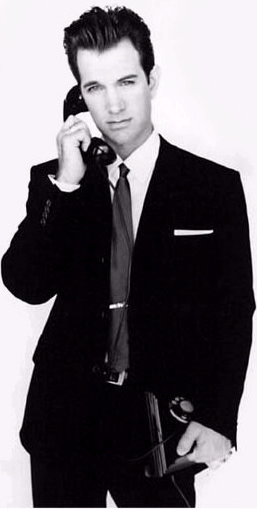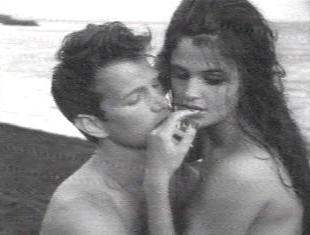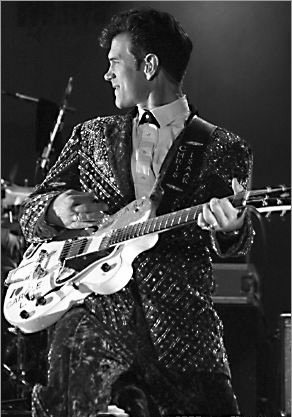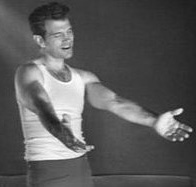

I was reading an article the other day by an author who worried the photographer for his book cover made him look a bit too studly. All the best writers-E.M. Forster, James Joyce, Edith Wharton, et al-were homely, he fretted, and good looks are an impediment to achieving the outsider status vital to great literature. The only exception he could name was F. Scott Fitzgerald, who more than atoned for his physical beauty with a severe mental breakdown and a premature, lonely, impoverished, alcoholic death.
I don't know if he resolved his dilemma because I got bored and stopped reading (I doubt Fitzgerald or anybody else in the Pantheon will have to worry about competition from this particular Adonis), but I'm not sure I like his thesis.
Which is not the same as saying it isn't sound. If anything, I suppose I should be encouraged-if his theory holds, I could be the next Gore Vidal. But unless you are a devoted watcher of the Charlie Rose show or "Booknotes," what an author looks like doesn't really signify. Take off the book jacket and pretend they all resemble Ralph Fiennes. In fact, that makes Henry Miller's prose a lot more plausible.
That doesn't work when the writer in question writes songs and sings them successfully enough that the recording industry takes an interest. No matter how I've tried, I cannot persuade myself the Tom Petty from the album covers and videos looks like Ralph Fiennes. But in music, the homely artist ethos makes sense. In every interview I've read with a male singer-songwriter, the subject has stated the impetus behind his career was a desire to attract women. (Strangely, no female singer-songwriters have cited the urge to attract men as their prime motivator. Pat says this is because all women are filthy liars, but I suspect they could find easier ways.)

And it makes sense in an evolutionary psychology kind of way, art as compensation. Some would say my idols Pete Townshend, Mark Knopfler, and Daniel Ash have a bit to compensate for, but the pretty boys of pop music are suspect. Go ahead and throw the likes of Rick Springfield and A-ha at me, I can't help but lump them with those creepy boy bands, and images of fat middle aged managers, homoerotic publicity machines, and genuinely ugly songwriters slipping weepy compositions under some closet door. (I'm sure my fabulous cousin Evelyn will be happy to rebut my libel against Springfield; she can be reached though this publication.) When you do get a spectacular exotic like David Bowie, well, he doesn't spend a lot of time crooning moony how-I-miss-you tunes.
And then there's Chris Isaak. He is as cute as a button, has a pretty tenor voice, has been cast in the movies of directors Jonathan Demme, David Lynch, and Bernardo Bertolucci, has retained his lean, muscular boxer's figure, is a charming and articulate subject in interviews, and he writes his own songs! In fact, his whole career has a patina of self-sufficiency that nobody as conventionally handsome as he is can match in pop music. On the other hand, his career hasn't been as brilliant as you'd think, given his combination of attributes.

(Written by Sharon C. McGovern)
It's
a big, blue Spanish sky
I lay on my back and watch clouds roll by
I've got the time to wonder why she left me
It's a slow, sad Spanish song
I knew the words, but I sang them wrong
The one I love has left and gone without me
Now
she's gone, gone, gone--
our world has changed
Watching a blue sky, thinking of rain
From "Somebody's Crying":
I
know somebody and they called your name
A million times and still you never came
They go on loving you just the same
I know that somebody's trying

From "San Francisco Days":
Walking
down to Market Street
feeling my heart skip a beat
To see someone who looks like you,
I guess that I'm not through
Dreaming of the one I love,
you know what I'm dreaming of
San Francisco days, San Francisco nights
And from "Baby did a Bad Bad Thing":
You
ever toss and turn, lying awake and thinking of the one you love? I didn't
think so.
You ever close your eyes making believe you're holding the one you're dreaming
of? Well if you say so.
It hurts so bad when you finally know just how low low low she'll go
Baby did a bad, bad thing…feel like crying
In one album cover after another, Chris Isaak proves it's possible to suffer both sincerely and decorously due to women who keep breaking his heart. To them I say, "Thank you!" and then, "Please stop!"
